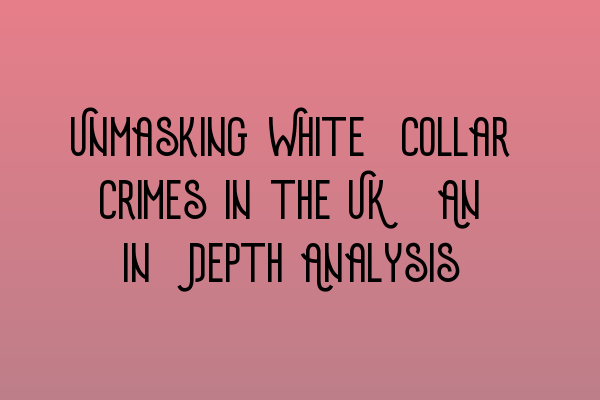Unmasking White-Collar Crimes in the UK: An In-Depth Analysis
White-collar crimes have become a significant concern in the UK. These sophisticated crimes, usually committed by professionals in a business or government setting, involve fraud, embezzlement, money laundering, insider trading, and other financially motivated illegal activities.
In this blog post, we will conduct an in-depth analysis of white-collar crimes in the UK, exploring their characteristics, impact, legal framework, and the crucial role played by the criminal justice system in addressing and preventing such offenses.
Characteristics of White-Collar Crimes
White-collar crimes are often characterized by their non-violent nature and the use of deception, manipulation, and abuse of trust to achieve financial gain. These crimes can range from small-scale fraudulent activities to large-scale corporate scandals that affect the economy on a national or even global scale.
Common examples of white-collar crimes include:
- Corporate fraud
- Bank fraud
- Tax evasion
- Insider trading
- Money laundering
- Embezzlement
- Identity theft
These crimes are often complex and require specialized knowledge to investigate and prosecute. Law firms and solicitors specializing in criminal law play a crucial role in uncovering and prosecuting white-collar crimes.
The Impact of White-Collar Crimes
White-collar crimes can have severe consequences for individuals, organizations, and society as a whole. The financial losses incurred by victims can be substantial, leading to bankruptcy, unemployment, and even the collapse of entire businesses. Furthermore, these crimes erode public trust in institutions and undermine the integrity of our economic systems.
It is essential to shed light on white-collar crimes and hold those responsible accountable to maintain a just and ethical society.
The Legal Framework for Prosecuting White-Collar Crimes
Prosecuting white-collar crimes requires a comprehensive legal framework that addresses the complexity of these offenses. In the UK, the legal framework governing white-collar crimes primarily includes legislation such as the Fraud Act 2006, Proceeds of Crime Act 2002, and the Bribery Act 2010.
These laws define the offenses, establish penalties, and provide guidance for investigating and prosecuting white-collar crimes. Solicitors specializing in criminal law need to have a deep understanding of these statutes to build a strong case against white-collar criminals.
The Role of the Criminal Justice System
The criminal justice system in the UK plays a crucial role in handling white-collar crimes. Investigation agencies, such as the Serious Fraud Office (SFO) and the Financial Conduct Authority (FCA), collaborate with law enforcement agencies and legal professionals to identify, gather evidence, and prosecute individuals involved in white-collar crimes.
Law firms specializing in criminal law, such as SQE Criminal Law & Practice Law UK, have a vital responsibility to represent and defend accused individuals while ensuring the interests of justice are served. These firms work tirelessly to navigate the complexities of white-collar crimes and offer legal expertise at every stage of the criminal justice process.
Conclusion
In conclusion, white-collar crimes pose a significant threat to the UK’s financial stability, public trust, and ethical values. It is crucial to have a robust legal framework and expert solicitors who can effectively investigate, prosecute, and unmask those involved in these crimes.
To learn more about the legal profession and prepare for the SQE exams, check out our related articles:
- SQE 1 Practice Exam Questions
- SQE 1 Practice Mocks FLK1 FLK2
- SQE 2 Preparation Courses
- SQE 1 Preparation Courses
- SRA SQE Exam Dates
Stay informed, stay proactive, and let us fight against white-collar crimes.
